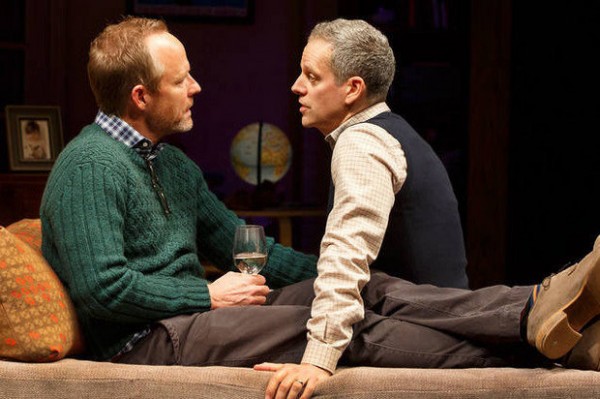Now that same-sex marriage is the law of the land and many gay men are leading “heteronormative” lives complete with children and mortgages, how will they adjust to the excruciating rigors of monogamy, parenthood, and not constantly going to bars? That’s the vital questions two new Off-Broadway plays are daringly asking (sarcasm intended.) Side note: there is a lesbian character in one of the plays, but she plays a supporting part and is not vital to the action.

Credit: Joan Marcus
Coincidentally Peter Parnell’s Dada Woof Papa Hot from Lincoln Center Theatre and Mark Gerrard’s Steve from The New Group opened within a few days of each other. Both shallowly portray a group of upper-middle-class gay friends, many of whom are unable to cope with long-term commitment and indulge in meaningless affairs. The acting, direction, and design is professional and precise in both cases, but the scripts wear thin long before their respective ninety-minute running times click off. Dada focuses on parenthood and is a tad deeper than the jokier Steve, which overdoses on musical theater references and gimmicky supertitles. Both have moments of humor and pathos but are ultimately disappointing.
In Dada, Alan and Rob’s marriage seems perfect on the surface. They have a lovely apartment (John Lee Beatty created the gorgeous sliding sets), a sweet pre-kindergarten-age daughter named Nikki, and apparently successful careers as writer and therapist. But Alan is frustrated by a shortage of journalistic work and Nikki’s preference for Rob, her biological father. So he launches an affair with Jason, a much younger married gay dad with fidelity issues of his own.
The two daddies in Steve, Steven and Stephen—cute that they have almost the same name, huh?—face similar conflicts. Stephen compulsively trades sexually explicit texts with one of the couple’s best friends Brian and Steven retaliates by sleeping with an attractive waiter named Esteban. Meanwhile, Brian and his partner Matt are having a live-in threesome with their trainer, also named Steven. Do you sense a pattern here? The nearly identical names bit is stretched too much like many of Gerrard’s other gags such as the endless quoting of show lyrics. Also in the mix is Carrie, the token lesbian of the group who is afflicted with cancer and may get a movie deal out of her blog. Steven, Matt, and Carrie met as singing waitstaff in a Broadway restaurant and have abandoned their attempts at musical-comedy careers. The theme of crushed dreams and mourning for lost youth is an intriguing one, but Gerrard fails to develop it.

Credit: Monique Carboni
The playwrights have the worthy concept of showing that gay people can be just as screwed up as their straight counterparts when faced with the challenge of building a socially-sanctioned life with one partner, but the protagonists of Dada and Steve are defined by their sexual impulses and their psychological motivations are not sufficiently explored to get us to care about them. In Dada, Alan comes across as a whiny narcissist and in Steve we get sketchy show fans. A good therapist would work wonders with these people. Since they can afford nannies, weekends on Fire Island, private schools, and fabulous NYC apartments you’d think they would try one.
Despite the thinness of the material, directors Scott Ellis (Dada) and Cynthia Nixon (Steve) deliver polished, sparkling stagings and the casts gamily try to infuse their roles with the subtext the authors fail to provide. In Dada, John Benjamin Hickey almost makes the kvetchy Alan bearable and Tammy Blanchard illuminates her cameo part of a pushy actress with an attractive energy. The Steve crowd has more opportunity for fun including a pre-show sing-along at a stand-up piano. As the main couple, Matt McGrath and Malcolm Gets search in vain for the lovers beneath the quips and the song lyrics. Ashlie Atkinson is more successful in defining the caustic Carrie and the hilarious Mario Cantone at least gets to cut up as Matt.
Dada Woof Papa Hot: Nov. 8—Jan. 3, 2016. Lincoln Center Theater at Mitzi Newhouse Theatre, 150 W. 65th St., NYC. Tue.—Sat., 8 p.m.; Wed., Sat., 2 p.m.; Sun., 3 p.m. Running time: 90 minutes with no intermission; $77-$87; (212) 239-6200 or www.telecharge.com.
Steve: Nov. 18—Jan. 3, 2016. The New Group at the Pershing Square Signature Center, 480 W. 42nd St., NYC. Tue.—Fri., 7:30 p.m.; Sat., 8 p.m.; Sat., Sun., 2 p.m. Running time: 90 minutes with no intermission; $27—$97; (212) 279-4200 or www.ticketcentral.com.
This review has previously appeared on ArtsinNY.com and Theaterlife.com.
